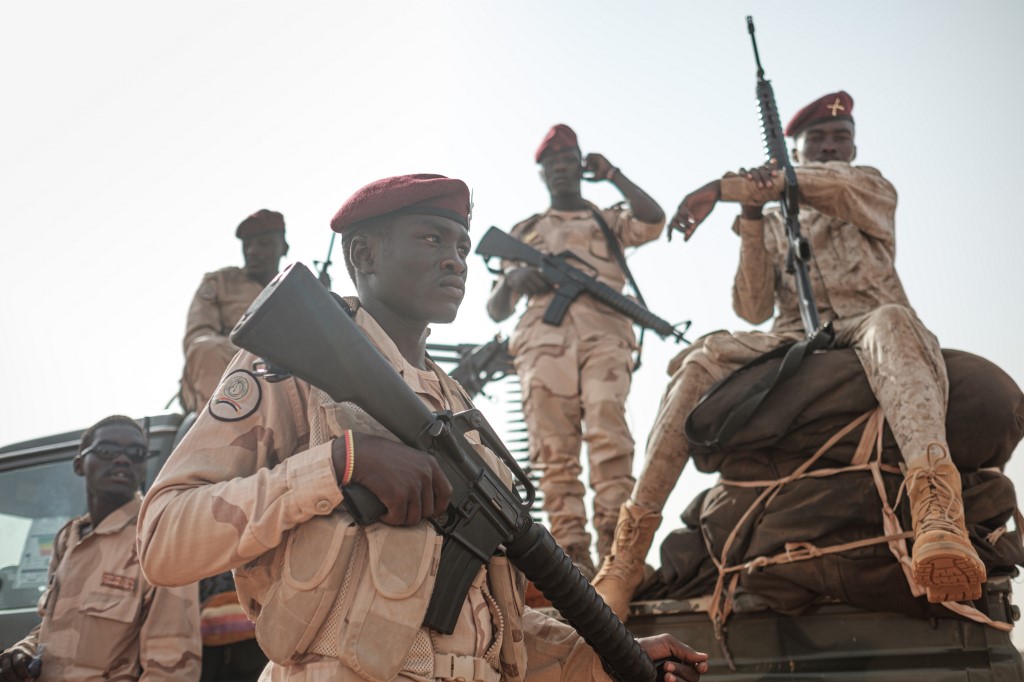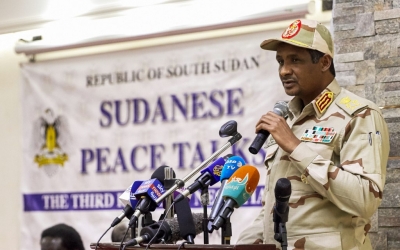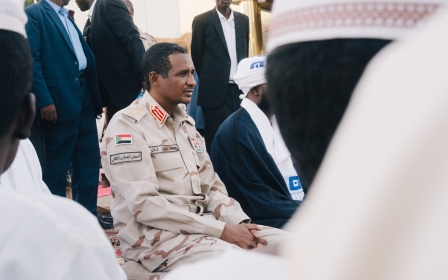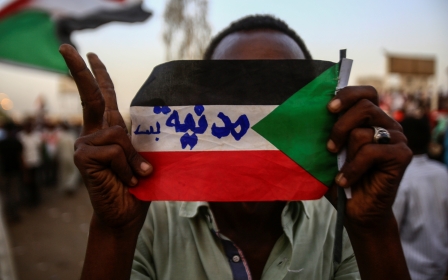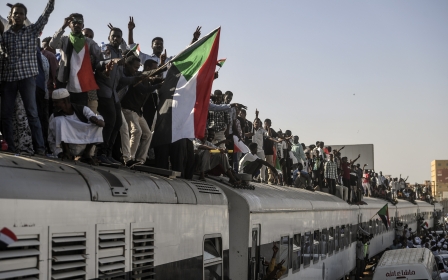To the people of Sudan, Hemeti is no peacemaker
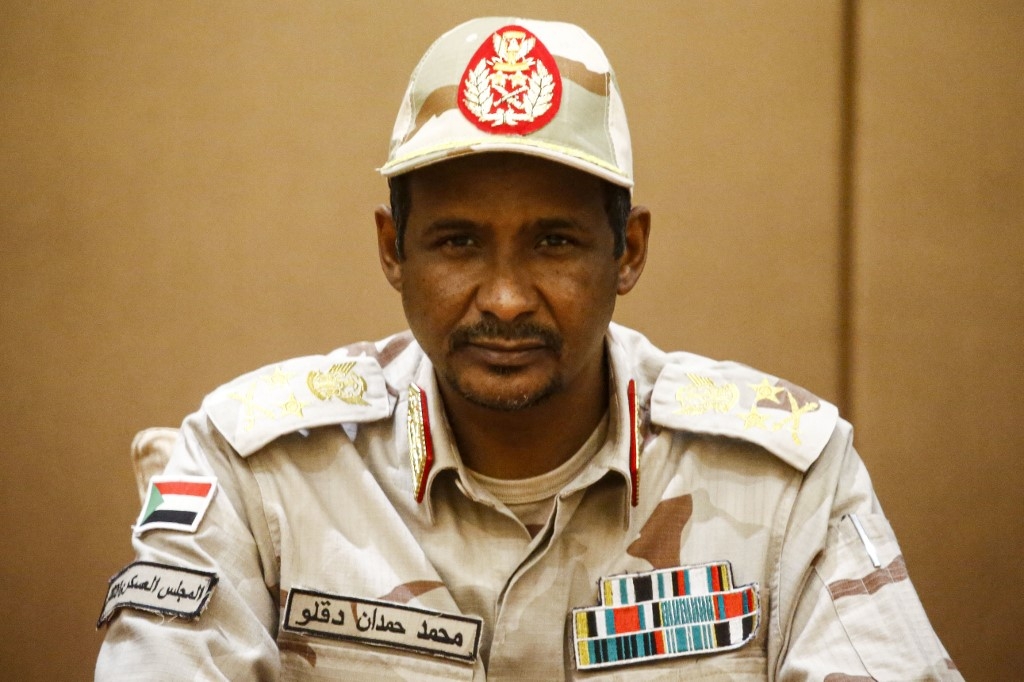
Ever since he was appointed deputy head of Sudan’s transitional military council, international and local media have kept their eyes on Hemeti, the leader of Sudan’s Rapid Support Forces (RSF) - and he knows it.
After the brutal and highly public 3 June massacre, in which the RSF allegedly killed more than 120 peaceful protesters, Hemeti signed a $6m contract with a Canadian lobbying firm to “ensure favourable international as well as Sudanese media coverage” to help him achieve his goal of attaining “recognition as the legitimate transitionary leadership of the Republic of the Sudan”.
Pieces such as Peter Oborne’s “Is Sudan turning a page on its troubled history?” might help with that goal. The article portrays Hemeti as a promising figure for Sudan’s progress - yet many Sudanese see Hemeti not as a facilitator of development, but rather as a hindrance.
Suppressing Darfur rebellion
Oborne notes in his article: “Hemeti is now leading negotiations with rebel leaders that could bring an end to conflicts in which he played such a brutal role,” alluding to Hemeti’s history as a leader of the Janjaweed militias, later legitimised as the RSF, that suppressed rebellion in Darfur and carried out ethnic cleansing.
New MEE newsletter: Jerusalem Dispatch
Sign up to get the latest insights and analysis on Israel-Palestine, alongside Turkey Unpacked and other MEE newsletters
Oborne remains optimistic about the peace process, writing: “Last month, Sudan opened the way to end the long-running insurgencies in the Blue Nile and South Kordofan states by signing a provisional peace agreement with a rebel group.”
While the bulk of authority should theoretically lie with the government's civilians, little indicates that they have the power to oppose the military's will
Yet, only the Blue Nile faction of the Sudan People’s Liberation Movement-North (SPLM-N) signed the agreement. The government has not made any significant agreement with the SPLM-N in South Kordofan, led by Abdelaziz al-Hilu.
Tensions between the government and Hilu began just two days into the peace process last year, when the latter suspended negotiations after the RSF attacked Hilu’s territory. Ever since, the government has tried and failed to sign a declaration of principles with one of Sudan’s most powerful rebel groups. At the core of this lack of progress is the government’s refusal to officially agree to secularism, which would represent an official departure from the former regime’s Islamism.
Slowing down the peace process
The government’s lack of progress with Hilu paints a bleak image of the Sudanese peace process and Hemeti’s role in it. But this is just one way Hemeti and the RSF have slowed down the process.
There was also the brutal massacre in al-Geneina, West Darfur, at the beginning of this year, which resulted in 80 deaths and displaced more than 8,000 families. Amid the violence, Darfuri rebel groups temporarily suspended peace talks.
Victims and a local crisis management committee reported that the massacre was carried out by the RSF. The continued presence of the RSF and the military in government - a setup Hemeti insisted on - has been the main reason why Abdelwahid al-Nur’s faction of the Sudan Liberation Movement rebel group has refused to sit down for talks.
This challenges the notion that Hemeti is a “peacemaker”, or at the very least, represents a radical departure from former President Omar al-Bashir, who, like Hemeti, also mediated South Sudanese peace talks in 2018 and signed deals with rebels in 2005 and 2006.
Oborne argues that “tectonic shifts” are taking place in Sudan’s political structure, but it’s worth noting that the purportedly civilian-led government meant to transition Sudan to democracy still has an unelected military president. While the bulk of authority should theoretically lie with the government’s civilians, little indicates that they have the power to oppose the military’s will.
In some cases, civilians are explicitly prevented from exercising authority over the military, such as with military reform, which Sudan’s constitutional document decrees is to be led by the military itself.
Lack of accountability
There is a clear lack of accountability for the military which calls into question whether “radical change” has been actually made. And while a committee has been formed to investigate the 3 June massacre, Sudanese people are pessimistic about its efficacy.
A part of this pessimism stems from the knowledge about the legal immunity granted to members of the Sovereign Council by the constitutional document. This immunity can be lifted only by a vote of the Transitional Legislative Council, but even then, there’s an understanding among the Sudanese populace that any attempt by civilians to prosecute the military would result in the civilians’ overthrow.
This means that what is marketed as a civilian-led government has, up until now, been de-facto military authoritarianism, where unelected members of the military in high offices subvert civilians’ authority with impunity.
The new government has yet to definitively leave behind the military dominance, corruption and Islamism of the former regime.
The views expressed in this article belong to the author and do not necessarily reflect the editorial policy of Middle East Eye.
Middle East Eye delivers independent and unrivalled coverage and analysis of the Middle East, North Africa and beyond. To learn more about republishing this content and the associated fees, please fill out this form. More about MEE can be found here.



